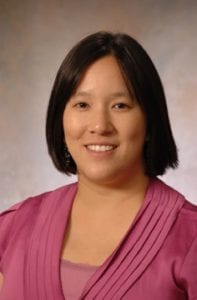
Trainee Author: Jessica Chong, PhD
Acting Instructor
University of Washington
This paper demonstrates the importance and complexity of understanding the genetic basis for Mendelian diseases and that this understanding can have broader implications in understanding developmental mechanisms. This manuscript explores the genetic cause of a rare form of autosomal-dominant multiple pterygium syndrome (MPS).
MPS typically presents as autosomal-recessive suggesting a different genetic etiology in the dominant transmissions. This study and methodology illustrate the field of human genetics has both progressed and remains true to its original gene discovery roots.
ASHG: Could you describe your research for us?
Dr. Chong: Most of my research focuses on the genetics of rare Mendelian conditions –identifying the gene that is mutated in individuals with a particular phenotype as well as studying the landscape of Mendelian conditions as a whole.
I am also part of the University of Washington Center for Mendelian Genomics and our center provides free sequencing and analysis assistance for researchers and clinicians around the world who have samples from individuals with unexplained Mendelian conditions. Many of these individuals have a rare disease that is so rare, it has yet to be described in the literature.
ASHG: What are your career goals?
Dr. Chong: Besides gainful employment, I haven’t entirely decided what I want yet! I’m open to either going into industry and staying in academia. I do enjoy working on rare diseases because each one is different and figuring out the genetics is both incredibly helpful to families and informative about basic biology, so I’m hoping to stay in this area in the future.
ASHG: Why did you choose genetics as your field of study?
Dr. Chong: In 7th grade, I was assigned to give a presentation on an interesting topic for my science class. I think I had read a newspaper article about gene therapy and was really excited about it, so I went to the library and took out a giant book all about gene therapy (Altered Fates: The Genetic Re-engineering of Human Life). I read the book all the way through and thought the molecular techniques used to introduce genes using viruses seemed like the coolest idea ever. That kindled my interest in genetic disorders because I realized that you can’t possibly begin to offer gene therapy for a disorder if you don’t even know which gene is mutated in patients with that disorder. I guess this really stuck with me because 18 years later, it’s what I’m actually researching every day!
ASHG: Describe yourself in three words.
Dr. Chong: Pragmatic, geeky, happy.
The Trainee Paper Spotlight highlights outstanding papers written by trainee members of ASHG. Submit your science to be featured, and join the ASHG Trainee Forum to keep up with new ones.
